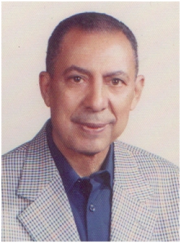
Hosny Omar
- Position: Professor
- Department: Department of Physics
- Email: mhamomar@aucegypt.edu
Hosny Omar is a professor at The American University in Cairo. Since joining AUC in 1968, Hosny has served as physics unit head many times, and department chair twice; as well as on many university committees.
Omar teaches the first general physics courses (phys.111/123/124), where he helps motivate and provide instruction to young undergraduates in the first years of their study. Omar has participated in the development of the Freshman labs (Phys. 123/124), and has also developed and continues to develop the Advanced Physics Labs ( Phys. 322/323 ). These Labs represent the state of the art in physics undergraduate teaching and are a valuable asset to the University. Omar also teaches Physics 416, a course intended to teach students the applications of physics, electronics technology and semiconductor devices in industry. His numerous contacts in the industrial community are put to the service of arranging field trips. This approach give his students the opportunity to visit factories all over Egypt and allows them to see and learn how physics is being utilized in modern technology.
Omar received his B.Sc from Ain Shams University (1957), and his M.Sc in "Applied Thermodynamics" (1960) and Ph.D in "Experimental Physics at Low Temperatures" (1962) from Leiden University, Holland.
- Low Temperature Physics
- Physics of Semi Conducting Glasses
- Solar Energy and Solar Cells
- Physics Education and Laboratory Instruments Design and Construction
- Curriculum Development for Secondary Schools
- Environment and Pollution.
- Temperature Calibration and Standardization.
- High Vacuum Technology.
- Gas liquefaction and very low temperature techniques (installation, operation and maintenance).